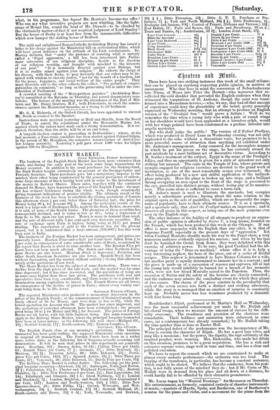COatrto lath 3uoir.
amusement. Who that bore in mind the conversion of Nebuchadnezzar into Ninus, of Moses into Peter the Hermit—who moreover that re- collected the cold shudder that pervaded the English audience when they witnessed the temptations of St. Anthony, though the saint was trans- formed into a Mussulman devotee,—who, we say, that had all that amount of experience could deny the plausibility of the belief, pretty generally expressed on Wednesday morning, that an attempt to produce an English version of the "Prodigal Son " would prove a failure ? Well do we remember the time when a young lady who with a pair of round wings on her shoulders would have been applauded as a harmless sylph, would with her wings pointed have been condemned as a profane intruder into angelic mysteries.
But who shall judge the public ? The version of L'Enfant Prodigne, which was produced at Drury Lane on Wednesday evening, was not only applauded to the echo without a dissentient voice, but promises to be a more powerful source of attraction than anything yet exhibited under Mr. Anderson's management. Long censured for the incomplete manner in which he put his pieces on the stage, he has certainly atoned for past misdeeds by a most brilliant act of decorative virtue. According to M. Scribe's treatment of the subject, Egypt is the scene of the Prodigal's follies, and thus an opportunity is given for a style of splendour not only striking but unusual. The orgie in the Temple of Isis, where priests and nymphs engaged for religious exercises are devoted to the grand work of inebriation, is one of the most remarkable scenes ever witnessed ; the effect being produced by a new and skilful application of the inclined- plane principle. Here the plane is broken up into steps, and a brilliant throng occupying an area equal to the front of the stage is presented to the eye, parcelled into distinct groups, without losing any of its massive- ness. This scene alone is sufficient to cause a town-talk.
M. Auber's music is used to illustrate the spectacle, but occupies merely a subordinate position ; having about the same relation to the original opera as the sets of quadrilles, which are so frequently the expo- nents of popularity, have to their ultimate source. It is as a spectacle, and a spectacle only, that Azael the Prodigal makes an impression ; and it deserves all praise in this respect, as being one of the most gorgeous ever seen on the English stage.
The other instance of the futility of all attempts to prophesy an expres- sion of public opinion is afforded by Sixtus V, a long drama, founded on the French, which has been produced this week at the Olympic. If any office is more unpopular with the English than any other, it is that of Supreme Pontiff, especially in the present days of "aggression." Yet when Cardinal Montalto steadily made his way to the Papal chair, a very numerous audience evidently enjoyed his success ; and when by his ipso dixit he banished the Orsini from Rome, they were delighted with this exercise of arbitrary power. To be sure, the good Cardinal had the ad- vantage of being the "Deus ex machine," whose office it is to help a very interesting nephew, the hero of the piece, out of a series of direful serapes. This nephew is determined to have Bianca Colonna for a wife, but another party is equally determined to immure her in a convent; and the piece is made up of a succession of rescues and captures, till at last the young lady would infallibly be burned for a breach of her monastic vows, were not her friend Montalto raised to the Popedom. Thus, the accession of Sixtus and the safety of the heroine are closely connected ; and the audience may admire the concluding event for which they please of two causes. The charm of the piece consists in the peculiarity that each of the seven scenes sets forth a distinct and striking adventure, while the story is so managed that an emotion of surprise is constantly kept up. Probably never was less weariness produced by a dramatic work four hours long.


























 Previous page
Previous page